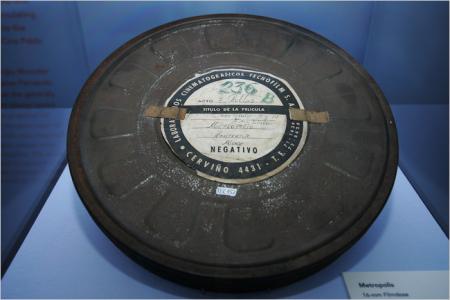Bridging Gaps: Politics and Completion

On January 13, 2011, the John F. Kennedy Library Foundation presented the results of a four-year, $10 million dollar initiative: a searchable digital archive of 200,000 pages of documents, 1,500 photos, 72 reels of film, and audio of all of President Kennedy's speeches. This still-growing collection is easily the largest online presidential archive.
Giving a press conference at the National Archives in Washington, D.C., Caroline Kennedy, the President of the Kennedy Library Foundation and President Kennedy's daughter, explained how, "Using today's technology, we will be able to give today's generation access to the historical record and challenge them to answer my father's call to service to solve the problems of our own time." This sentiment, that the ongoing digitization of the historical archive bridges the span between concerns of the past and the politics of the present, was echoed by Archivist of the United States, David Ferriero: "For students today, if it isn't online it doesn't exist. The digital archive extends the reach of our nation's historical heritage right into homes and classrooms."
One of the major Kennedy administration calls to service mentioned by Caroline Kennedy, indeed one of President Kennedy's first presidential acts, is the establishment of the Peace Corps. Founded via executive order on March 1, 1961, the Peace Corps was inaugurated with the intent of cooperatively bridging gaps between America and other countries. Digitization can, as both Kennedy and Ferriero hope, open the past into the present. In fact, digitization presents us with an unimagined opportunity to bridge political moments and even, perhaps, correct past errors.
A recent National Endowment for the Humanities grant is attempting to do just this. Receiving a joint fund whose burden will be shared by the NEH and the Deutsche Forschungsgemeinschaft, archivists will be digitizing Judaica catalogued at the Leo Baeck Institute in the Center for Jewish History in New York. These volumes, part of 2,000 or so once housed in the Frankfurt Library that were either destroyed or dispersed during World War II, form an integral part of the Judaica archive. Carol Kahn Strauss, Executive Director of Leo Baeck Institute, enthused, "The Wissenschaft des Judentums [Science of Judiasm] volumes housed at LBI will fill in the missing gaps of Frankfurt's collection, thereby virtually recreating a pre-Holocaust Jewish library."
This is a promising possibility for initiatives in digital archiving. Important parts of various collections have been scattered during eras of political strife, and digitization presents an opportunity to complete, recreate, and make available versions of broken archives.
A similar story surrounds Fritz Lang's Metropolis. Premiered in Berlin in 1927, this landmark film was met with great controversy that almost immediately led to numerous, variant edits and reedits. Over the years and due to numerous political turmoils, the master was lost, and all that remained were numerous versions produced by any number of interstitial censoring agents. Fritz Lang, decades after the film's release, claimed Metropolis a film "that does no longer exist [sic]."
As the film has gained in prestige, finding a master copy has become increasingly valuable. Various scholars, archivists, studios, and collectors have poured over disparately available archival material and attempted and reattempted to form a master cut approximating the premiere cut. On July 1, 2008, film experts in Berlin announced that a 16 mm reduction negative of the long-considered-lost original premiere cut of the film had been discovered in the archives of the Museo del Cine in Buenos Aires, Argentina. Subsequently, another heretofore unknown version was discovered in New Zealand. After exhaustive effort, financed between numerous governmental and private agencies, a digitally restored original version of Metropolis, perhaps the world's most influential science fiction film, was screened; this took place nearly 83 years after its Berlin premiere. This version, now safely archived in digital form, has also screened at the PFA in 2011. Only a few heavily damaged scenes, totaling approximately eight minutes, were not included in the new cut.
Via the cooperation of agencies in Argentina, Germany, and New Zealand, and via the effort of numerous film historians and restorers, this major work, once thought lost to the shifting sands of political history, was digitally restored and archived. A film heavily censored for, amongst others, its strident, incendiary politics can finally be seen approximately as it once was.
In a 1961 press conference, when asked whether he would put his official papers in a library in Washington D.C., President Kennedy answered, "Through scientific means of reproduction ... and this will certainly be increased as time goes on, we will find it possible to reproduce the key documents so that they will be commonly available." It appears this moment is upon us.